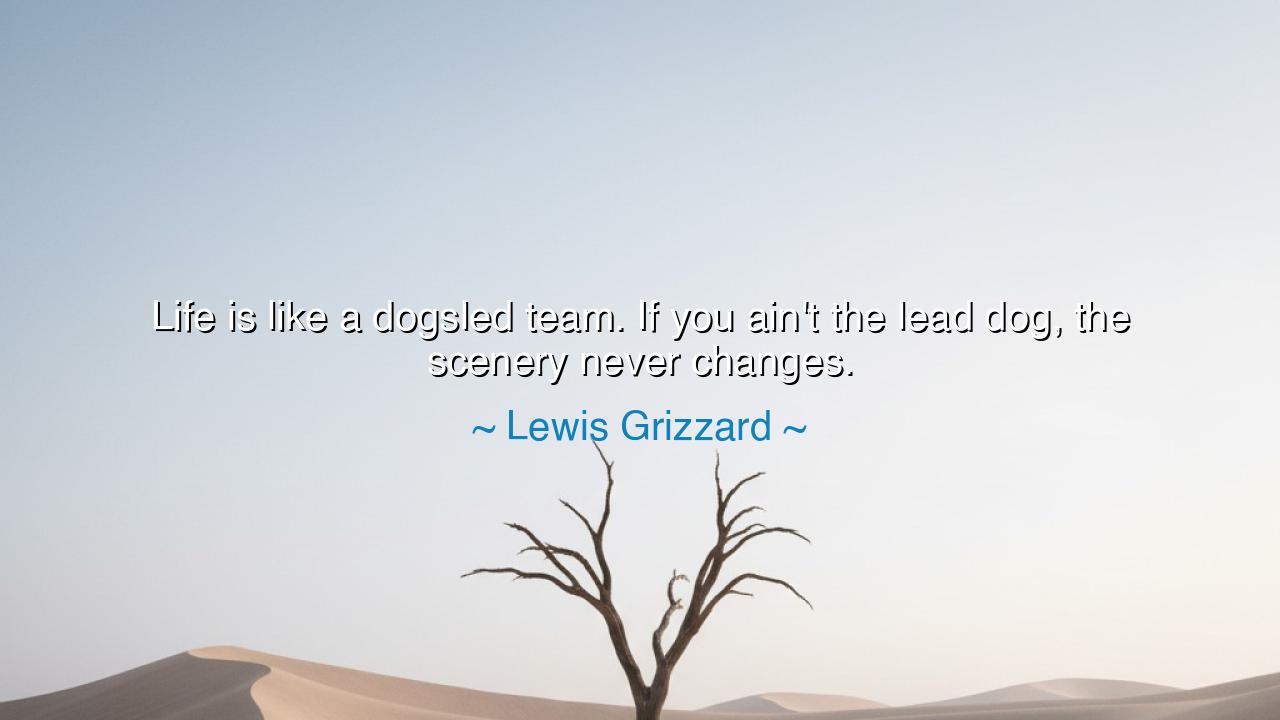
Life is like a dogsled team. If you ain't the lead dog, the






In the vast journey of life, there is wisdom to be found in the simplest of analogies. Lewis Grizzard offers us one such analogy with his words: "Life is like a dogsled team. If you ain't the lead dog, the scenery never changes." This powerful statement calls attention to the nature of leadership, ambition, and the drive for personal growth. Just as a dogsled team moves forward, with one dog leading the pack and the others following behind, life itself offers us a choice: to take the reins, to lead, or to follow, knowing that the scenery—our experiences, our growth, our successes—depends heavily on the role we choose to play.
The ancients understood the difference between leading and following in their own way. The Greek heroes, such as Achilles and Odysseus, were celebrated not simply for their strength or skill, but for their courage and leadership. Achilles, the mighty warrior of the Iliad, did not follow the call to battle; he led his men into the heart of the conflict, where victory and death were intertwined. His destiny was shaped by his decision to take the lead—to change the course of history with every choice he made. In contrast, those who followed, while essential to the success of the mission, could never experience the same level of glory or transformation. The scenery, as it were, remained the same for them, for their role was not to innovate, but to follow the direction set by others.
Similarly, Alexander the Great, a name that echoes through the corridors of history, was a leader who ventured into the unknown, conquering lands far beyond the boundaries of the known world. His vision and ambition led him to places that few could imagine. He took the lead in his journey, not simply for personal glory, but to change the world forever. Those who followed in his wake, though they too saw the world, did so through the lens of his leadership. The scenery, for them, was shaped by his vision, not their own. This dynamic between leading and following is at the core of Grizzard’s analogy—those who lead are the ones who change their path, while those who follow remain fixed in a direction set by another.
In the same vein, the story of Christopher Columbus comes to mind. Though Columbus did not have the title of emperor, he was a leader who, against all odds, believed in a new way to reach the East Indies. His ambition and courage led him across an uncharted ocean to a new world. The scenery for Columbus and his crew was nothing short of transformative—the discovery of the New World was a new chapter in human history. Yet for those who sailed with him, the journey, though grand, was still defined by Columbus's leadership. They witnessed the unknown, but it was Columbus who changed the course of their lives, not only by discovering new lands but by opening doors to new possibilities.
For us, Grizzard’s words remind us that the path we choose is integral to the life we lead. To be the lead dog is to take charge of our own fate, to push through challenges and blaze a trail for others to follow. It is not simply about seeking fame or power, but about personal growth, taking responsibility for our actions, and seeing the world through a lens of self-determination. To follow, on the other hand, is to allow others to guide our course, to experience life as it is shaped by the vision of those who lead us. It is important to recognize that both roles are necessary—there are times when following is a form of support, but to truly live in a way that transforms the scenery, we must choose to lead, to take the reins of our own journey.
The lesson here is one of empowerment: we are not meant to simply pass through life as passive participants, waiting for others to define our path. Each of us has the power to shape our own scenery, to lead our lives with purpose and direction. Whether we choose to lead in our careers, our relationships, or our personal growth, we must recognize that the changes we desire in the world begin with the changes we make in ourselves. As Plato taught, true philosophy is not just about understanding the world, but about taking action in it—about leading ourselves toward the highest ideals.
So, let us embrace the wisdom of Grizzard and the ancient heroes: we must not let life pass us by as passive spectators, watching the scenery remain the same. Let us choose to lead, to take control of our destiny, and in doing so, transform not only our lives but the lives of those around us. The lead dog does not merely see the scenery—it creates it. The path we choose will define the life we lead, and in that choice, we have the power to change the world, one decision at a time. Let us lead with purpose, and in doing so, let us shape a new scenery for ourselves and for those who follow.






AAdministratorAdministrator
Welcome, honored guests. Please leave a comment, we will respond soon